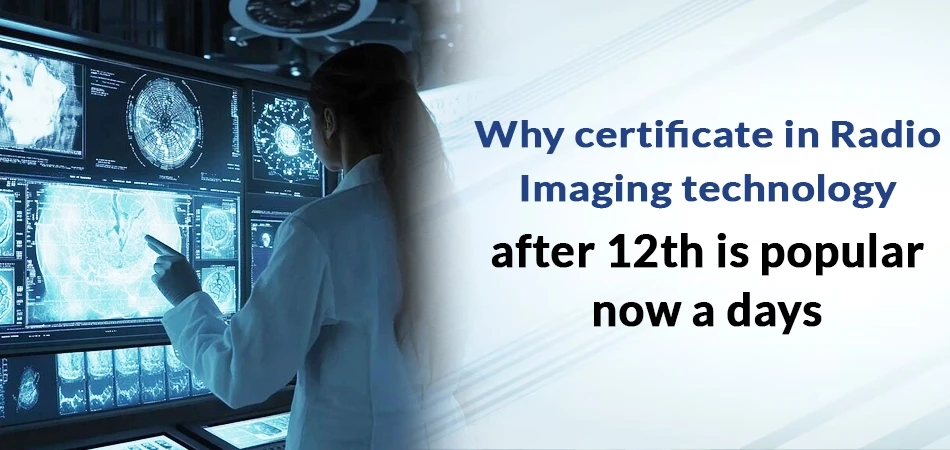Why Certificate in Radio Imaging Technology After 12th Is Popular Now a Days

The Radio and Imaging Technology Certificate Course mainly emphasizes the techniques and approaches used to recognize medical issues and carry out medical procedures for diagnosing or evaluating diseases. This medical field investigates the entire structure and function of the human body in parts, used for creating functional images. Although organs and tissues can be analyzed after being extracted for health reasons, they are generally categorized as pathology rather than medical imaging.
Radiological technology is used to produce medical images such as X-rays, MRI scans, and CT scans. Students are trained to assist with the correct management of X-ray and electrocardiogram procedures for patients.
What Covers in CRIT Course?
The Certified Radiology Imaging Technologist (CRIT course) is designed to provide advanced knowledge and skills for those looking to excel in the field of radiologic technology. Here’s what you can expect:
1. Course Structure
- Curriculum Overview The course typically covers topics such as advanced imaging techniques, radiation safety, patient care, and the latest technological advancements in radiology.
- Hands-On Training Expect practical labs and clinical experiences that allow you to apply theoretical knowledge in real-world settings.
2. Prerequisites
- Educational Background Generally, you’ll need a background in radiologic technology or a related field. Some programs may require you to hold a relevant certification before enrolling.
- Technical Skills Basic computer skills and familiarity with radiologic equipment will be beneficial.
3. Duration and Format
- Length The course duration can vary but typically lasts several months. Some programs may offer accelerated options.
- Delivery Mode Courses may be available in various formats, including online, in-person, or hybrid, providing flexibility based on your schedule.
4. Certification Preparation
- Exam Readiness The CRIT course is designed to prepare you for the certification exam. Expect review sessions, practice tests, and study resources to help you succeed.
- Continuing Education Some programs may also offer continuing education credits, which can be beneficial for maintaining certification.
5. Networking Opportunities
- Professional Connections The course often provides opportunities to meet industry professionals, which can help you build a network for future job opportunities.
- Mentorship Engaging with instructors and peers can lead to mentorship opportunities, further enhancing your learning experience.
Choose Ganesh Paramedical for CRIT Course
The CRIT course provides a vital chance for individuals looking to advance their careers in radiologic technology. By focusing on both theoretical knowledge and practical skills, you will be well-prepared for the industry's requirements and the certification exam. Welcome the journey of learning, and you will find it rewarding in your professional and personal life.
FAQs
1. What is the Certificate in Radio Imaging Technology?
The Certificate in Radio Imaging Technology program designed to provide students with the knowledge and skills necessary for a career in medical imaging, including techniques like X-rays, MRI, CT, and ultrasound.
2. Who is eligible to enrol in the program?
Typically, candidates should have a high school diploma or equivalent. Some programs may require prior coursework in science or healthcare.
4. How long does the program take to complete?
The duration varies by institution but generally ranges from a few months to a year, depending on whether you study full-time or part-time.
5. Is there a functional component to the program?
Yes, the program includes hands-on training in clinical settings where students can practice using imaging equipment and apply their knowledge in real-world scenarios.
6. What qualifications will I earn upon completion?
Upon successful completion, you will receive a certificate in Radio Imaging Technology, which can enhance your qualifications for various imaging-related roles.
7. Are there job placement services available?
Many programs offer job placement assistance, including resume workshops, interview preparation, and connections to employers in the healthcare field.
8. What career opportunities are available after earning the certificate?
Graduates can pursue roles such as Radiologic Technologist, MRI Technologist, CT Technologist, Ultrasound Technician, and Imaging Informatics Specialist.
10. How can I apply for the program?
You can apply through the institution’s website or admissions office. Make sure to check application deadlines and required documentation.
12. Can I work while attending the program?
Many students manage work while studying, especially if the program offers flexible scheduling. However, the intensity of the program may require careful time management.
13. What skills will I develop during the program?
Students will develop technical skills in imaging technology, critical thinking, problem-solving abilities, and effective communication skills essential for patient care and teamwork in healthcare settings.
14. Are there opportunities for further education after this certificate?
Yes, many graduates choose to pursue advanced degrees in radiologic technology or related fields, which can open up more specialized career paths.

